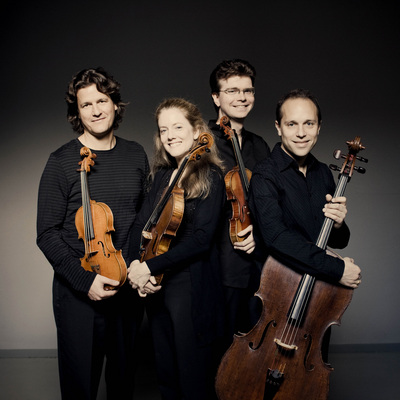St. Lawrence String Quartet coming to town with works old and (very) new

St. Lawrence String Quartet
photo by Marco Borggreve
Adams is but one of the many important contemporary composers whose works the quartet has premiered and played. And the SLSQ’s upcoming concert here features other contemporary works. One is a piece by R. Murray Schafer—“the dean of Canadian composers,” cellist Costanza calls him—a natural for a group with strong Canadian roots (even if it is in residence at Stanford University). Among Schafer’s catalog of 11 string quartets, it’s the third, from 1981—a highly theatrical work, with entrances and exits for the players and scripted vocalizations—that the quartet has favored most and that they reprise here.
“The confession is that we always seem to play the same one,” Costanza said in a recent phone call. “We really like it a lot.”
The quartet has had a fruitful, but much more limited relationship with the other contemporary work on Thursday’s bill, not for want of liking it, but for want of having it: the music for “Kohelet,” by renowned Argentinean composer Osvaldo Golijov, came in more slowly than anticipated.
PREVIEW
St. Lawrence String Quartet
- Who: Chamber ensemble presented by the University Musical Society.
- What: Music by Haydn, Schafer and Golijov.
- Where: Rackham Auditorium, 915 E. Washington St.
- When: Thursday, April 5, 7:30 p.m.
- How much: $22-$46, UMS Ticket Office in the Michigan League, 734-764-2538, and online at ums.org.
That doesn’t bother Costanza and crew. “What we have now is just under 20 minutes. In essence, it’s a full piece, not a long full piece, but a full piece. I could imagine there being more, but I could also imagine it standing alone for the future. We are game and open to it. And we love Ozzie, he’s a great guy, and his ideas are so inspired, so you are always getting something wonderful.”
Since the Stanford premiere, what the group has had from Golijov is a revised second movement. It’s the same length, but there are “a lot of harmonic differences. It’s still singing and beautiful, but it has a little more edge than it has before,” he said. “It’s as if he lived with the first version, thought about it, and spiced it up a bit.”
The SLSQ is no stranger to Golijov—they have worked with him since the early 1990s, and they netted two Grammy nominations for their 2002 recording of his “Yiddishbbuk,” a work they performed extensively again last season.
That the music for “Kohelet,” based on the book of Ecclesiastes, has come in slowly has not dimmed the SLSQ’s enthusiasm for either Golijov or the piece.
“We’re enjoying the process a lot,” Costanza said. “It’s exciting to be part of the act of creation.”
Bookending the Schafer and Golijov works are two Haydn quartets, Op. 74, No.1 and Op. 76, No. 2. Written, of course, more than two centuries ago, they are safely in the hands of the SLSQ. The innovation here is using Haydn as closer, not just as an opener.
“That’s something we get to do from time to time,” Costanza said. “Haydn is the classic opening piece, the appetizer. But there is so much going on in that music, and Op. 76, No. 2, is such a meaty piece. After the two new works in the middle, we’ll see how that arch comes through.”

